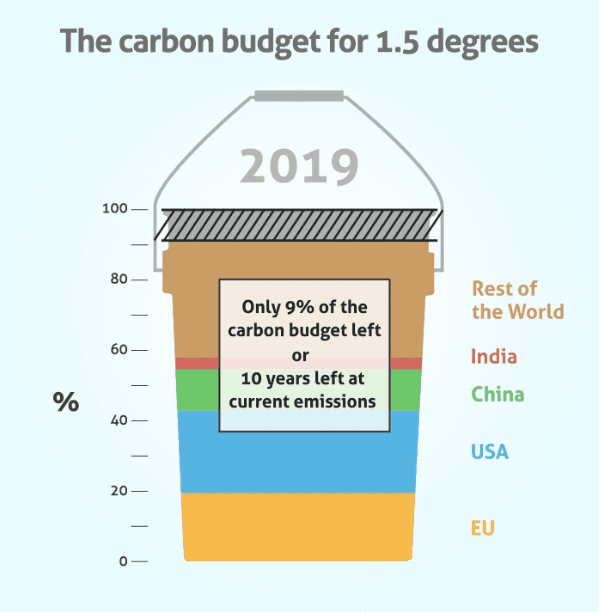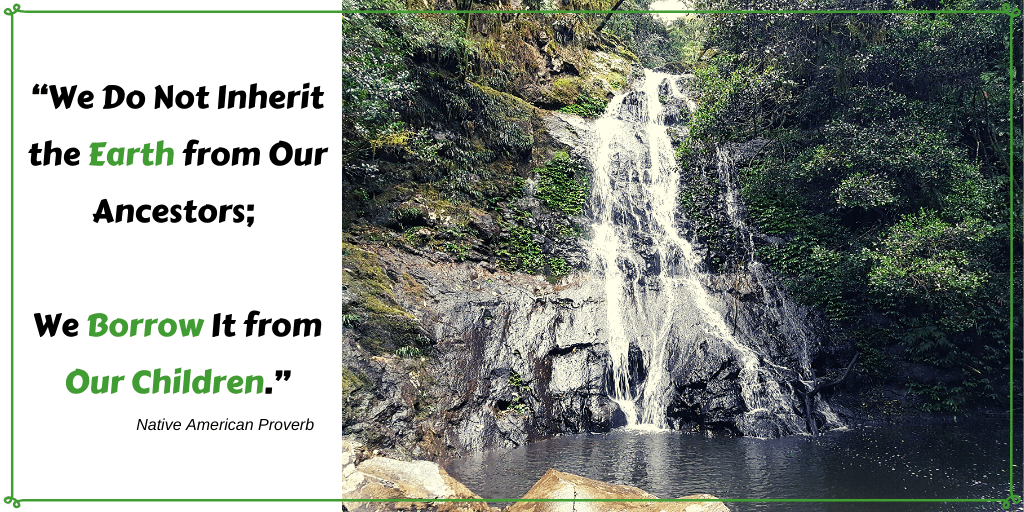Time to take off the rose coloured glasses. No more denial. No more blinkers on. No more heads in the sand. With only 10 years left at current emissions (or only 9% of the carbon budget left: Global Carbon Project) sound the alarm wherever you are – #climateemergency. The coming 10 years are also imperative for fulfilling the United Nations Sustainable Development Goals and the 2030 agenda, many of which address climate change.

Source: Global Carbon Project
Recent fires burning in Australia are a clarion call to all, with scientists saying the fire conditions this year are unparalleled on several fronts. Scientists predicted our current plight many many years ago and we just didn’t listen, or at least the ‘powers that be’ of the time didn’t. Worse still, I suspect it was covered up – too much of a threat to the dominant industry of the time. A threat that was too far in the future and most likely would never come to pass.
As early as 1896 Svante Arrhenius published a scientific paper regarding carbon dioxide emissions and its effect on temperature and global warming (see here), followed by Edward Olson Hulburt [de] in the 1930s (see here) and Guy Callendar.
And still many continue to ignore or silence some of the brightest individuals on the planet: our scientists. Recently more than 11,000 scientists co-signed a letter in the journal BioScience, calling for urgent action regarding the climate. World Scientists’ Warning of a Climate Emergency is a holiday must read. Easily digested over a coffee, the facts of climate change are presented, with one of the most striking comments:
The climate crisis is closely linked to excessive consumption of the wealthy lifestyle. The most affluent countries are mainly responsible for the historical GHG emissions and generally have the greatest per capita emissions
It goes on to detail “six critical and interrelated steps (in no particular order) that governments, businesses, and the rest of humanity can take to lessen the worst effects of climate change”: Energy, Short-lived pollutants, Nature, Food, Economy and Population.

Reducing global warming is a war that will need to be fought on many fronts. There is no silver bullet, no vaccine. This genie isn’t so easily put back in the bottle. Just many different solutions that will all need to be implemented simultaneously. Some will work, some won’t, but we have to act, however imperfectly initially – iterate, rework and strike again until we tackle the above issues.
Our work at World’s Biggest Garage Sale lies mainly within the Economy section, where the scientist’s state “Excessive extraction of materials and overexploitation of ecosystems, driven by economic growth, must be quickly curtailed to maintain long-term sustainability of the biosphere.” The way we produce, consume and manage end of life products needs to change fundamentally at a systemic level leading to increased resource efficiency and a reduction in energy consumption at all steps in the production process.
According to the Ellen MacArthur Foundation “45% of emissions comes from producing the cars, clothes, food, and other products we use every day. These cannot be overlooked. The circular economy can contribute to completing the picture of emissions reduction by transforming the way we make and use products.” Systemic change.

As you participate in the ritual of gift giving at Christmas time, consider the many sustainable options that are available and perhaps give a repurposed or pre-loved gift instead. Our recent circular economy popup ‘If The Shoe Fits’ has demonstrated that the tide is turning with regards to second-hand goods, with consumers looking for sustainable purchasing options. If you do end up with some gifts you don’t want or need over the festive season, then hold onto them for our next garage sale coming up in early 2020 – we’ll help you find another home for them.
There is something within all of these six areas the 11,000 scientists recommend that we can all be working on in business and personally. As the festive season closes in and we’re enjoying time with loved ones, living in an era our ancestors would argue was one of immense privilege (what they wouldn’t have given for hot running water, electricity at the flick of a switch and comfortable beds, not to mention the ridiculous number of gifts that abound at Christmas), reflect on the day to day choices you make that could have a positive effect on people & planet.
Look at the faces of your loved ones, especially the young ones, and think carefully about the future planet and society we’re leaving them with. If you’re in a position professionally to do something, then please speak up. And more importantly act.
To quote the Dalai Lama:
Taking care of our planet, is a matter of looking after our own home. We can no longer exploit the earth’s resources—the trees, water, air and minerals—with no care for the coming generations.
Thank you for your support throughout 2019. Wherever you are and whoever you are with this Christmas, honour and cherish your loved ones and appreciate and respect this amazing planet that we all call home – there is no Planet B. All the very best for the coming decade – let’s make it one where we can look back and say “We did all we could and are immensely proud to be human”!!
2020 Vision | 10 years | People, Planet, Purpose
By: Donaugh Austin